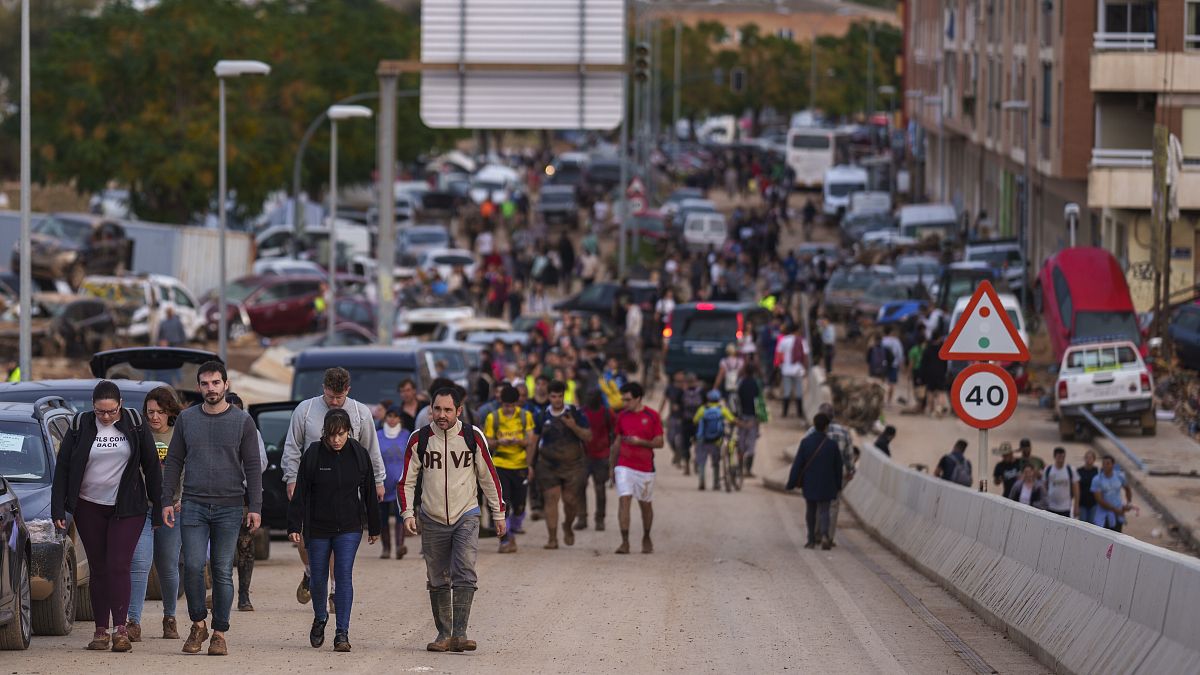The recent flooding in Spain has resulted in the deaths of 205 people and has caused extensive damage in multiple regions across the country. This natural disaster has prompted a wave of solidarity, with hundreds of volunteers arriving in the affected areas to help with cleanup operations. The influx of people offering assistance has been so high that authorities have urged them not to drive or walk to the affected areas in order to avoid blocking the roads needed by emergency services. As parts of Spain brace for more heavy rain in the coming days, hundreds of soldiers have been deployed to assist with rescue efforts in the hardest-hit areas.
Torrential rain and hailstorms on Tuesday led to flooding in various regions, with the eastern province of Valencia being the most severely affected. The damage caused by the flooding has been likened to that of a major hurricane or tsunami, with streets turning into rivers, homes being damaged, and cars and people being swept away. The death toll in the Valencia region alone has reached 202, with additional fatalities reported in neighbouring areas. Many people are still missing, and the number of casualties is expected to rise as some flood-affected areas remain inaccessible to authorities.
Efforts to locate bodies and survivors, as well as to provide aid to those affected by the flooding, have been in full swing with the assistance of 1,700 deployed soldiers. Spain’s Defence Minister Margarita Robles has stated that more troops will join the rescue and aid efforts in the coming days due to the significant amount of work that remains to be done. The overwhelming disaster has left authorities struggling to manage the crisis, leading to local volunteers stepping in to support emergency workers and provide much-needed help to survivors.
Criticism has been directed at the regional and central government regarding the lack of preparedness and response to the flooding disaster. Some residents have expressed anger towards local authorities and emergency services for what they perceive as insufficient support during the crisis. Opposition lawmakers have questioned the delay in issuing flood warnings and deploying rescue teams, placing the spotlight on the responsibility of regional authorities in implementing civil protection measures. The central government has emphasized that regional authorities are accountable for such emergency responses.
The regional government has faced backlash for not sending out flood warnings to residents until several hours after towns and villages had already been flooded. Amber rainfall warnings had been issued prior to the disaster, yet communication to residents was delayed, leaving many communities unprepared for the flooding. As the National weather service issues warnings for more rainfall in the affected regions, concerns about further flooding risks persist due to the saturated ground. While the upcoming rain is not expected to be as severe as the initial downpours, precautions are being taken to mitigate additional risks and ensure the safety of residents in flood-prone areas.
In light of the devastating impact of the floods in Spain, questions have arisen about the country’s safety measures and disaster response protocols. The high death toll from the recent flooding has marked it as one of the deadliest natural disasters in Spain’s recent history, leading to calls for accountability and improvement in emergency preparedness. The ongoing search and rescue efforts, combined with the support of volunteers and military personnel, are crucial in addressing the aftermath of the disaster and providing aid to those affected. As the nation grapples with the aftermath of the floods, it serves as a reminder of the importance of proactive measures in ensuring the safety and well-being of communities in the face of natural disasters.






























